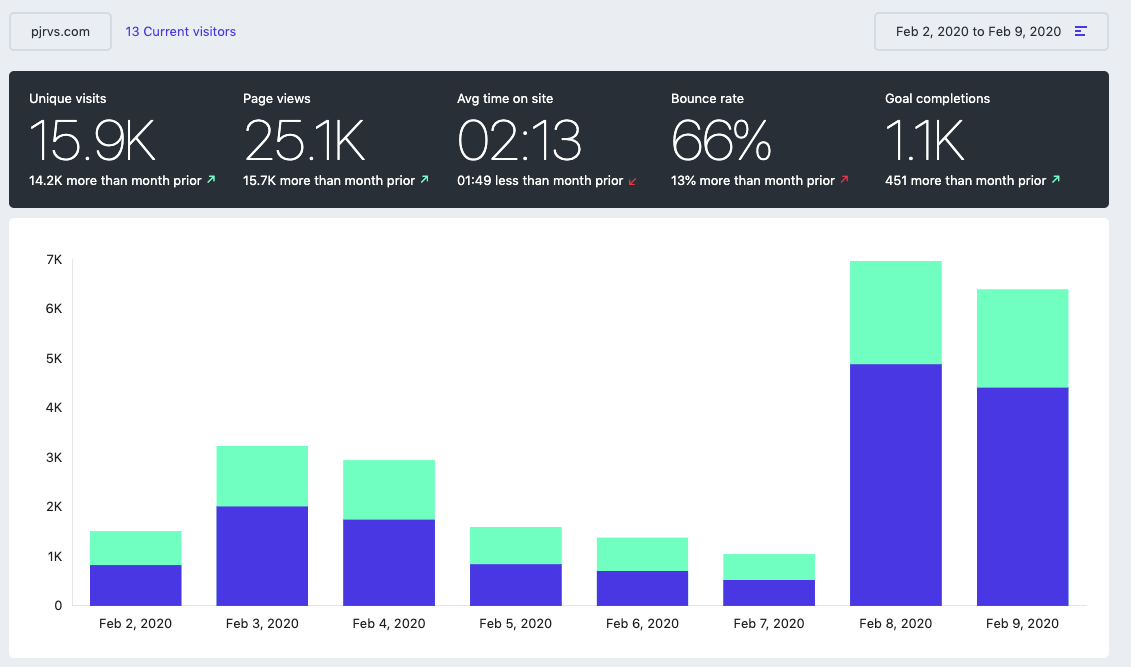Degoogle: Swapping Analytics for Fathom for visitor statistics
I’ve resolved to become more privacy conscious during 2020. I’m going to do this mainly by decreasing or eliminating my use of Google products. This post is the first of what is to become a series were I explore both free and paid-for alternatives to the suite of online products that Google offers.
First up we are going to look for a replacement for Google Analytics. Analytics is a tool that offers statistics and insights into what your visitors are doing on your websites. By some accounts more than 50 % of all websites use Analytics – a literal treasure trove of data about what people are doing on the internet given away by site owners to a mega-corporation for free.
Let’s see if we can find something else.
Searching for alternatives and settling on Fathom
I don’t need much when it comes to visitor statistics, just the bare essentials really. Most of the features that are in Google Analytics I never use anyway. This realization made looking for candidates much easier, and I quickly found one that I wanted to try: Fathom.
Fathom has a compelling story about how the founder wasn’t comfortable with the amount of tracking Google Analytics was doing and decided to build his own self-hosted version instead. This eventually turned into a SaaS offering (the Pro version) that I decided to try.
The actual Fathom app only has one page and shows you the most basic statistics. This is intentional since that is all that is collected!
Dashboard screenshot from the live dashboard demo:

In addition to what is shown above you can also see visitors per page, referring URLs, device and browser information and the country of origin of your visitors.
Also worth noting is the goal feature where you can measure custom interactions that isn’t just a normal page view. I highly recommend that you try the live dashboard above which collects statistics for the personal website of the founder and has a custom goal to track newsletter sign-ups. Neat!
Fathom charges users not on the amount of websites that you install tracking for but the number of monthly visitors that all the websites you use have. The most basic monthly plan starts at 14 USD for a maximum of 100 000 page views per month. The yearly plan gives you two months free and is billed at 140 USD per year.
The self-hosted version of Fathom is called Fathom Lite. This version is available on Github and a feature comparison in the README details how the Lite version differs from the paid-for Pro version. Besides the obvious, the Pro version mainly differs by not being cookie based and giving stronger guarantees for privacy. It is available on Docker Hub for quick experimenting.
Alternatives
There is another alternative to Fathom that is worth mentioning: Simple Analytics. I didn’t get a chance to try it out but it looks to serve a similar market as Fathom does while actually being slightly cheaper at 9 USD / month for the yearly plan. Simple Analytics also has a public demo that I encourage you to try. The collected statistics are very similar to Fathom.
For those that are looking for a more complete Google Analytics replacement and don’t mind self-hosting an interesting candidate might be Matomo. It is available on Docker Hub as a container image for easy deployment.
Impressions of Fathom
Everything has a price, and if you are not paying yourself then the revenue stream of the service you are using will have to come from somewhere else. This is turning into a truism when it comes to how the internet giants of today act. If you are not paying for it, you are the product as noted by many.
I’m quite satisfied with Fathom and have now become a paying customer without any particular qualms or complaints. Installation, billing and access has been a very easy and streamlined process.
The most important thing for me has been that the number of websites that you are allowed to add is unlimited and does not affect the monthly price. The only factor that affects your monthly price is the number of visitors per month that you have. Since I have quite a few sites, and only a handful of them get any visitors at all worth mentioning, this could have been a deal breaker but instead made it a sensible choice.
Fathom is now used by most of the websites that I publish online, including tedeh.ltd and the online docs used by jayson.
Degoogle project status
I'm dependent on plenty of services provided by Google. During 2020 I plan to at least reduce and if possible completely eliminate my usage of them. Below is my current progress so far.
- ☑︎ Google Analytics - I now use Fathom
- ☑︎ Google Chrome - I have switched to Brave Browser but the article is not yet finished!
- ☐ Gmail
- ☐ Gsuite
- ☐ Google Search
- ☐ Google Drive
- ☐ Google Maps

